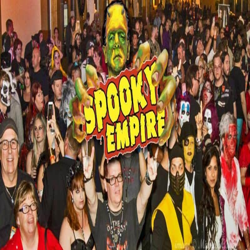ORLANDO, Fla. — Nov. 3, 2025 — Attorney Michael Lee, a trademark and brand-protection specialist, met a crowd at Spooky Empire this weekend, where he discussed the business—and legal—realities behind horror fandom, collectibles, and creator collaborations.
Held at the Orange County Convention Center, Spooky Empire is one of Central Florida’s longest-running genre gatherings, bringing together actors, artists, vendors, indie filmmakers, cosplayers, and thousands of fans.
“Conventions like Spooky Empire are where ideas become products overnight—stickers, tees, posters, resin figures, you name it,” Lee said. “That speed is exciting, but it’s also where rights can get tangled. Clear licenses, strong trademarks, and simple vendor policies keep the creativity flowing without risking takedowns or disputes.”
Lee emphasized practical steps for indie artists and boutique vendors:
-
Lock down core trademarks early—titles, logos, and character names—before committing to packaging or larger print runs.
-
Use short, plain-English licenses when collaborating with sculptors, printers, and co-designers, clarifying ownership, revenue splits, and convention-only limits.
-
Plan for marketplaces by keeping proof of ownership and license files ready for platforms’ notice-and-takedown systems.
-
Respect fan art while drawing clear red lines around counterfeit or safety-risk goods.
Lee also addressed hot-button topics such as AI-generated art and likeness rights. “If a piece evokes a specific performer or iconic character, treat it like you would any other licensed depiction,” he noted. “Cosplay photos, AI remixes, and mash-ups aren’t legally ‘free’ just because they’re transformative—context, consent, and contracts matter.”
Vendors at the show said the guidance was refreshingly actionable. “Most legal talks are theory. He told me exactly what to put in my vendor agreement before the holiday rush,” said an Orlando-based resin artist who sells limited-run creature busts.
Lee spent time on the convention floor meeting artists and small brands, reviewing packaging for trademark clarity, and sharing a one-page “con table checklist” covering SKU tracking, quality control for safety-adjacent items (like pins and props), and how to respond if a cease-and-desist lands during a show weekend. Also, Lee mingled with friends and clients famous in the horror movie community.
Lee, who frequently advises rights holders on anti-counterfeiting and licensing deals, said conventions remain a crucial barometer for what fans want—and what brands need to prepare for. “The line between fan culture and formal merchandise keeps blurring,” he said. “The smart move is to meet fans where they are with clear permissions and fair collaborations.”
Spooky Empire wrapped Sunday after three days of panels, vendor halls, and after-hours programming. Despite the “horrific” nature of the convention, no guests were injured during the horror convention…that we are aware of.
Editor’s note: For creators seeking a basic rights-readiness checklist from Lee’s talking points—trademark priorities, a one-page collaboration license outline, and a marketplace takedown prep sheet—say the word and I’ll draft it up.

